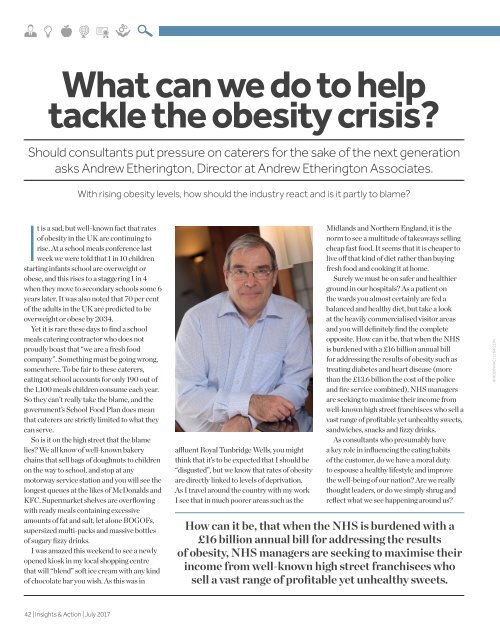EP Insights & Action
Expert observers comment on the Industry. This magazine is designed to bring together the thought leadership, ideas and opinions of leading consultants and operators from across the industry. EP's vision is to create an open narrative and debate that explains the perspective and thinking on the market and Industry. It will help all progress, so let us know your thoughts, subscribe and be involved.
Expert observers comment on the Industry. This magazine is designed to bring together the thought leadership, ideas and opinions of leading consultants and operators from across the industry. EP's vision is to create an open narrative and debate that explains the perspective and thinking on the market and Industry. It will help all progress, so let us know your thoughts, subscribe and be involved.
You also want an ePaper? Increase the reach of your titles
YUMPU automatically turns print PDFs into web optimized ePapers that Google loves.
What can we do to help<br />
tackle the obesity crisis?<br />
Should consultants put pressure on caterers for the sake of the next generation<br />
asks Andrew Etherington, Director at Andrew Etherington Associates.<br />
With rising obesity levels, how should the industry react and is it partly to blame?<br />
I<br />
t is a sad, but well-known fact that rates<br />
of obesity in the UK are continuing to<br />
rise. At a school meals conference last<br />
week we were told that 1 in 10 children<br />
starting infants school are overweight or<br />
obese, and this rises to a staggering 1 in 4<br />
when they move to secondary schools some 6<br />
years later. It was also noted that 70 per cent<br />
of the adults in the UK are predicted to be<br />
overweight or obese by 2034.<br />
Yet it is rare these days to find a school<br />
meals catering contractor who does not<br />
proudly boast that “we are a fresh food<br />
company”. Something must be going wrong,<br />
somewhere. To be fair to these caterers,<br />
eating at school accounts for only 190 out of<br />
the 1,100 meals children consume each year.<br />
So they can’t really take the blame, and the<br />
government’s School Food Plan does mean<br />
that caterers are strictly limited to what they<br />
can serve.<br />
So is it on the high street that the blame<br />
lies? We all know of well-known bakery<br />
chains that sell bags of doughnuts to children<br />
on the way to school, and stop at any<br />
motorway service station and you will see the<br />
longest queues at the likes of McDonalds and<br />
KFC. Supermarket shelves are overflowing<br />
with ready meals containing excessive<br />
amounts of fat and salt, let alone BOGOFs,<br />
supersized multi-packs and massive bottles<br />
of sugary fizzy drinks.<br />
I was amazed this weekend to see a newly<br />
opened kiosk in my local shopping centre<br />
that will “blend” soft ice cream with any kind<br />
of chocolate bar you wish. As this was in<br />
affluent Royal Tunbridge Wells, you might<br />
think that it’s to be expected that I should be<br />
“disgusted”, but we know that rates of obesity<br />
are directly linked to levels of deprivation.<br />
As I travel around the country with my work<br />
I see that in much poorer areas such as the<br />
Midlands and Northern England, it is the<br />
norm to see a multitude of takeaways selling<br />
cheap fast food. It seems that it is cheaper to<br />
live off that kind of diet rather than buying<br />
fresh food and cooking it at home.<br />
Surely we must be on safer and healthier<br />
ground in our hospitals? As a patient on<br />
the wards you almost certainly are fed a<br />
balanced and healthy diet, but take a look<br />
at the heavily commercialised visitor areas<br />
and you will definitely find the complete<br />
opposite. How can it be, that when the NHS<br />
is burdened with a £16 billion annual bill<br />
for addressing the results of obesity such as<br />
treating diabetes and heart disease (more<br />
than the £13.6 billion the cost of the police<br />
and fire service combined), NHS managers<br />
are seeking to maximise their income from<br />
well-known high street franchisees who sell a<br />
vast range of profitable yet unhealthy sweets,<br />
sandwiches, snacks and fizzy drinks.<br />
As consultants who presumably have<br />
a key role in influencing the eating habits<br />
of the customer, do we have a moral duty<br />
to espouse a healthy lifestyle and improve<br />
the well-being of our nation? Are we really<br />
thought leaders, or do we simply shrug and<br />
reflect what we see happening around us?<br />
How can it be, that when the NHS is burdened with a<br />
£16 billion annual bill for addressing the results<br />
of obesity, NHS managers are seeking to maximise their<br />
income from well-known high street franchisees who<br />
sell a vast range of profitable yet unhealthy sweets.<br />
© ROBYNMAC | 123RF.COM<br />
42 | <strong>Insights</strong> & <strong>Action</strong> | July 2017
















